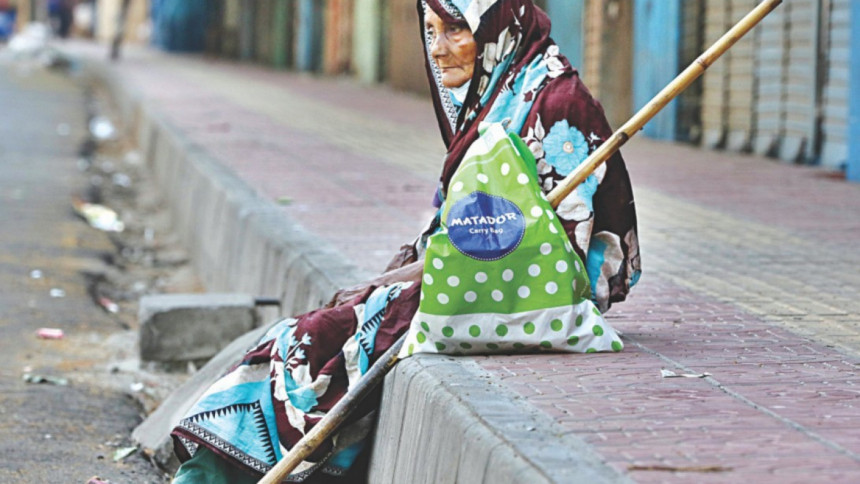Shutdown ended, not their hardship

With the lifting of the shutdown, food relief and cash charity have almost come to a standstill, though incomes of many poor families saw no recovery.
Those who had lost their jobs in the coronavirus-induced shutdown are not faring any better in the partially reopened economy.
Many told this correspondent that they have not received any food or monetary assistance from anyone after Eid-ul-Fitr, observed on May 25.
Rimu from Mirpur's Bhashantek slum said she had received some dry food including rice, lentils, oil, potatoes and sugar from the local commissioner, NGOs and some youth groups twice during the shutdown.
It was a big help, said the 26-year-old wife of a day labourer.
Though her husband's income has halved now, no one visits them any longer to see how they are doing, Rimu lamented.
"We need at least Tk 12,000 per month to maintain our family of four, pay the house rent and loan instalments [against the amount] that I borrowed earlier from microcredit [organisations] and some relatives," she added.
The income of Eti's family from Mirpur's Bauniabadh slum have also reduced drastically since the pandemic.
Three members of the family once had work -- Eti did handicraft, her mother worked as a part-time maid, while her father pulled a rickshaw.
Together their income sometimes neared Tk 20,000 a month.
But now, only Eti's 55-year-old father has his earnings of about Tk 500 a day.
Eti stopped getting orders for her work from the last week of March, while all six employers of her mother refused to allow her in their houses because she lives in a slum.
"My mother is now jobless," said 15-year-old Eti.
It has become hard to maintain the rent, food and other expenses for the family with just one member's income, she said.
The family didn't receive any food or monetary support from anyone since the beginning of the Covid-19 outbreak.
Eti said she had submitted photocopies of her father's NID to a local political leader's associates in the slum for relief but nothing has happened.
"In fact, there has been no relief distribution in our slum after the Eid-ul- Fitr," she said.
Md Billal Hossain, a barber who lives near Bauniabadh slum area of Mirpur, said it seems that the days of distributing relief items, taking photos and uploading those on the internet have come to an end.
"These days, nobody is here to give me a fistful of rice without work," said Billal.
FUNDS RUNNING DRY
Although there is still need for assistance, many private charities and benevolent individuals cannot help as they are not able to raise funds.
Bidyanondo Foundation, a voluntary organisation that worked on large scale relief distribution during the shutdown, has shifted their focus on providing health support.
They stopped that programme because they feel people now have the option to work, earn and buy food, said one of the representatives of Bidyanondo, who has been with the organisation since its inception.
Non-resident Bangladeshis, who donated to Tanzina Aktari's Tears of Middle Class, also hold similar views.
Tanzina said she has stopped contacting people for donations because she feels nobody is willing to donate money in such uncertain times.
Donors themselves are afraid for their future survival, she said.
"These days, many are helping their relatives in distress, saying their poorer relatives need the support," she added.
During the first few months of the pandemic, Tears of Middle Class had sent money through mobile banking to more than 100 middle-income families.
Habib Prince, a member of charity organisation Prottoy, said they too had to stop their relief activities due to fund scarcity.
"Our members, who are service holders, are facing a salary cut and are anxious about their job security.
"The ones, who run businesses, are facing huge losses due to the shutdown. Those who live abroad are unable to send remittance like before. This is why we are taking a break," said Habib.
Before Eid-ul-Fitr, Prottoy had provided food, masks, hygiene products to 500 lower-income families of Kapasia in Gazipur.
BRAC STUDY
A Brac survey conducted among 2,317 respondents across the country showed that 95 percent households experienced income loss because of the pandemic.
The study, titled "Economic Impact of Covid-19 Pandemic and Way Forward for Bangladesh", also found that average household income decreased to 76 percent of the normal in April and May.
Released last month, the survey was conducted between May 9 and 13 with 68 percent respondents from rural areas and 32 percent from urban areas.
It also showed that 69 percent of households, who needed help, received none while only 14 percent received cash or food assistance.
More than half the respondents opined that the government should continue food and cash aid.


 For all latest news, follow The Daily Star's Google News channel.
For all latest news, follow The Daily Star's Google News channel. 



Comments